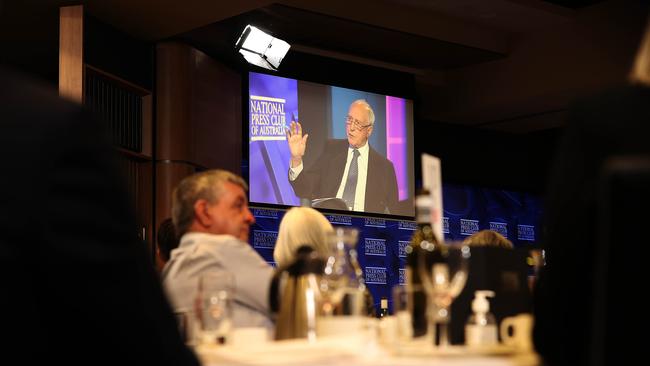Paul Keating dead wrong on China and Japan, but half right on subs

He has a bad habit these days of saying things that just aren’t so. He claims China’s economy is bigger than that of the US. Wrong. You only get to that outlandish conclusion if you use the notional purchasing power parity formulation. Using market exchange rate dollars (ie real dollars, you can’t buy a submarine with PPP dollars), the US economy is 40 per cent bigger than China’s.
Keating repeated one of his weirdest, most egocentric claims, that he produced the APEC leaders’ summit. APEC was founded by Bob Hawke in 1989. It was convened at leaders’ level by Bill Clinton in 1993. Keating’s role in this was so central that Clinton doesn’t mention Keating in his memoirs at all (though he has warm words for John Howard).
Keating’s dogmatic assertion that Virginia-class submarines will be obsolete if we get them in the 2040s or 50s is true only if nuclear submarines are obsolete altogether by then. The US will continuously upgrade its submarines. As a close ally, we’d get the upgrades too.
Keating also vents some ugly prejudices.

He seems to regard it as necessary to repeatedly insult Japan. His long time ugliness towards Japan has no rational explanation. Perhaps Keating’s loyalty to Beijing’s strategic interests impels him. He seems now to have added India to the list of nations he will routinely slag off.
His dismissive remarks about Taiwan are chilling. If in Keating’s faux Olympian moral anemia he thinks the fate of a 25 million-strong democracy is of no concern to us, then there is no reason anybody should ever think that the fate of our 25 million-strong democracy is of any concern to them.
His portrayal of Beijing as being supremely benign – just given to a little occasional rudeness – is basically nuts. He would be a disastrous strategic guide for a Labor government.
Nonetheless, he had two important insights. One is that there is something anomalous in Australia making its central Asian commitment a grouping – AUKUS – which involves Britain but no Asian nation.
I love and respect the Brits. They are friends and allies. But at the end of the day they don’t live and die in Asia. If things get hot, they can go home, as they have done in the past. Or they can send a tiny expeditionary force to help, as we do to distant conflicts. By all means celebrate, maximise the British relationship, but don’t pretend it’s strategically central.
After the US, the most important nation for us strategically should be Japan, and then, in a basket, India, Indonesia, Singapore, South Korea, and other key Asian neighbours – but above all Japan.
Which leads me to Keating’s second important point. To pit the Australian Defence Force, even with eight nuclear propelled subs, in any context against China, Keating says, would be to throw match sticks against the mountain. That’s broadly true.
But let’s be absolutely clear. Australia has no defence force capable of defending ourselves, with no strike capability, no ability to push aggressors away at distance, no war-fighting mass and no discipline in force structure, because we have deliberately chosen not to acquire such a defence force. The Morrison government has continued that pathetic national tradition in full.
We would always expect to be operating in coalition with our allies, chief among them the US. This has led, sadly, to a shocking form of psychological and operational dependence in the structure of the ADF, such that it is designed to provide only niche supplemental capabilities to the US, never under any circumstances to do anything militarily significant on its own.
We have consciously chosen this national impotence. Israel, with an economy about a quarter the size of Australia’s, can provide for its own strategic and tactical security.
We are so wealthy we could certainly produce an ADF which would provide an independent deterrent. We could create an ADF which would mean that any potential aggressor, whatever its size, would have to factor in paying a terrible cost if it acted against us. We have chosen deliberately to be defenceless, except for our reliance on the US, which has never been more total than now.
Keating was right, too, to mock the time line of the proposed AUKUS nuclear subs. AUKUS has been wildly over boomed. It delivers nothing beyond the nuclear subs, and these are now scheduled to come in science fiction time.
Our defence and technological intimacy with the US was already highly developed, long before AUKUS. We already get lots of US kit exclusively. No one else gets the US submarine combat system. No one else gets the electronic warfare Growler planes we operate.
Keating was right to argue that we will need another conventional sub before we get the nukes. Defence Industry Minister Melissa Price and our ambassador in Washington Arthur Sinodinos both this week dismayingly said the nuclear subs will be built in Adelaide. Given the mind boggling complexity of nuclear boats, this single commitment guarantees these subs are decades away at best.
Keating is right in one larger sense too. This debacle arises from our lack of commitment to, and imagination concerning, Asia. Tony Abbott’s strategic vision to partner with Japan, with deep US involvement, in acquiring modern, conventional submarines was right in terms of submarine capability, but also, more important, on deeper strategic grounds.
US, Japanese and Australian submarines will always operate in alliance. Their technological fusion would have been a profound and beneficial strategic development. All three allies would have been strengthened. And we would nearly have our first sub now.
Everyone involved in choosing the French subs should hang their heads in shame.
The ludicrous French over-reaction to losing the submarine contract shows how fraudulent is their strategic commitment to the Indo-Pacific. They lose a contract so they try to blow up Australia’s entire strategic position. They are not seriously concerned about China or anything else beyond their own commercial interests. The contrast with Japan is striking. We asked the Japanese to help us with subs but then betrayed their agreement, embarrassed them and gave the deal to France. The Japanese, and a lot of Americans, thought we did this because we were scared of Beijing’s reaction if we chose Japan.
The Japanese were deeply annoyed, but our profound strategic relationship with Tokyo continued. Our whole national submarine fiasco should be taught in Harvard MBA classes as the gold standard of dysfunctional, disastrous government policy.







Paul Keating’s remarks at the National Press Club were his now usual combination of gibberish, strategic madness, misrepresentation, prejudice, genuine shafts of insight, and linguistic inventiveness.